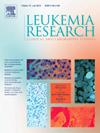Safety, tolerability, and pharmacokinetics of ASP1235 in relapsed or refractory acute myeloid leukemia: A phase 1 study
IF 2.1
4区 医学
Q3 HEMATOLOGY
引用次数: 0
Abstract
Acute myeloid leukemia (AML) is an aggressive hematologic malignancy. Although new agents including targeted therapies for relapsed or refractory (R/R) AML have been introduced, poor outcomes remain, requiring the need for novel approaches. One novel approach is the use of antibody-drug conjugates (ADCs). We conducted an early phase clinical trial with ASP1235, an ADC targeting FMS-like tyrosine kinase 3. In total, 43 patients with R/R AML were treated with ASP1235. The most common adverse events (AEs) included elevated liver transaminase levels, ocular toxicity, and muscular weakness. Ocular treatment-emergent AEs (TEAEs) were observed in 53 % of patients; most were mild or moderate in severity. The most common ocular TEAEs were blurred vision, dry eye, keratitis, photophobia, and reduced visual acuity. Serious (grade ≥3) ocular TEAEs occurred in 16.3 % of patients, with only 1 patient experiencing grade 4 keratitis. Six patients achieved composite complete remission (complete remission [CR] + CR with incomplete hematologic recovery + CR with incomplete platelet recovery), 2 of whom proceeded to hematopoietic cell transplantation with long-term leukemia-free survival. This trial was registered at www.clinicaltrials.gov as #NCT02864290.
ASP1235在复发或难治性急性髓性白血病中的安全性、耐受性和药代动力学:一项1期研究
急性髓性白血病(AML)是一种侵袭性血液系统恶性肿瘤。尽管包括靶向治疗复发或难治性AML (R/R)在内的新药物已经被引入,但不良的结果仍然存在,需要新的方法。一种新的方法是使用抗体-药物偶联物(adc)。我们对靶向fms样酪氨酸激酶3的ADC ASP1235进行了早期临床试验。共有43例R/R AML患者接受了ASP1235治疗。最常见的不良事件(ae)包括肝转氨酶水平升高、眼毒性和肌肉无力。在53. %的患者中观察到眼部治疗突发ae (teae);大多数是轻度或中度的严重程度。最常见的眼部teae是视力模糊、干眼、角膜炎、畏光和视力下降。16.3% %的患者发生严重(≥3级)眼部teae,仅有1例患者发生4级角膜炎。6例患者实现了复合完全缓解(完全缓解[CR] +血液学不完全恢复的CR +血小板不完全恢复的CR),其中2例进行了造血细胞移植,长期无白血病生存。该试验在www.clinicaltrials.gov注册为#NCT02864290。
本文章由计算机程序翻译,如有差异,请以英文原文为准。
求助全文
约1分钟内获得全文
求助全文
来源期刊

Leukemia research
医学-血液学
CiteScore
4.00
自引率
3.70%
发文量
259
审稿时长
1 months
期刊介绍:
Leukemia Research an international journal which brings comprehensive and current information to all health care professionals involved in basic and applied clinical research in hematological malignancies. The editors encourage the submission of articles relevant to hematological malignancies. The Journal scope includes reporting studies of cellular and molecular biology, genetics, immunology, epidemiology, clinical evaluation, and therapy of these diseases.
 求助内容:
求助内容: 应助结果提醒方式:
应助结果提醒方式:


